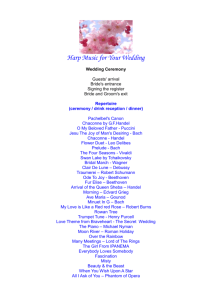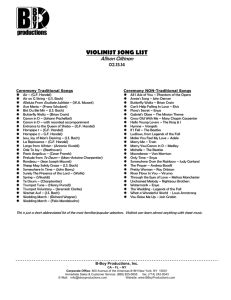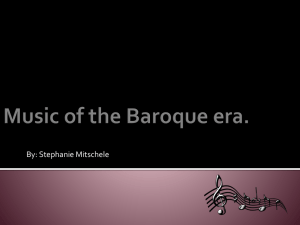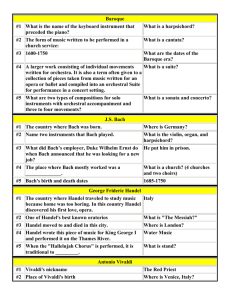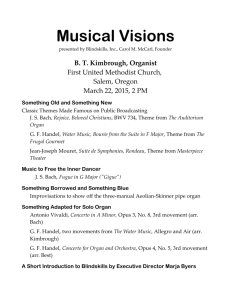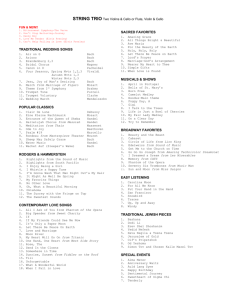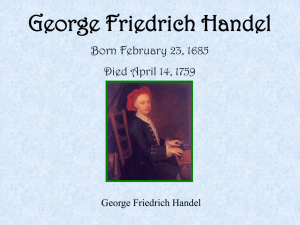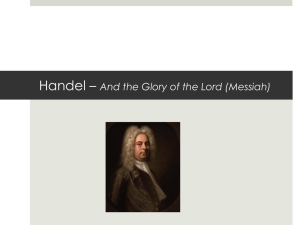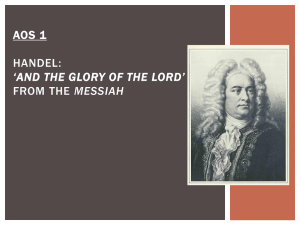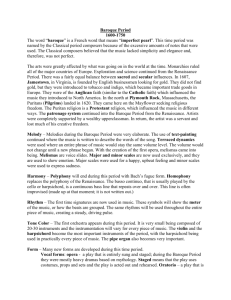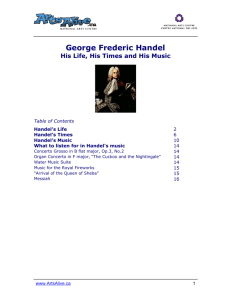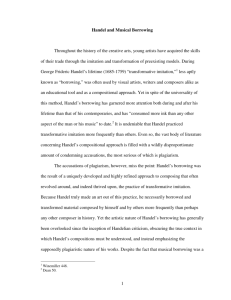"Baroque Composer" Lesson
advertisement
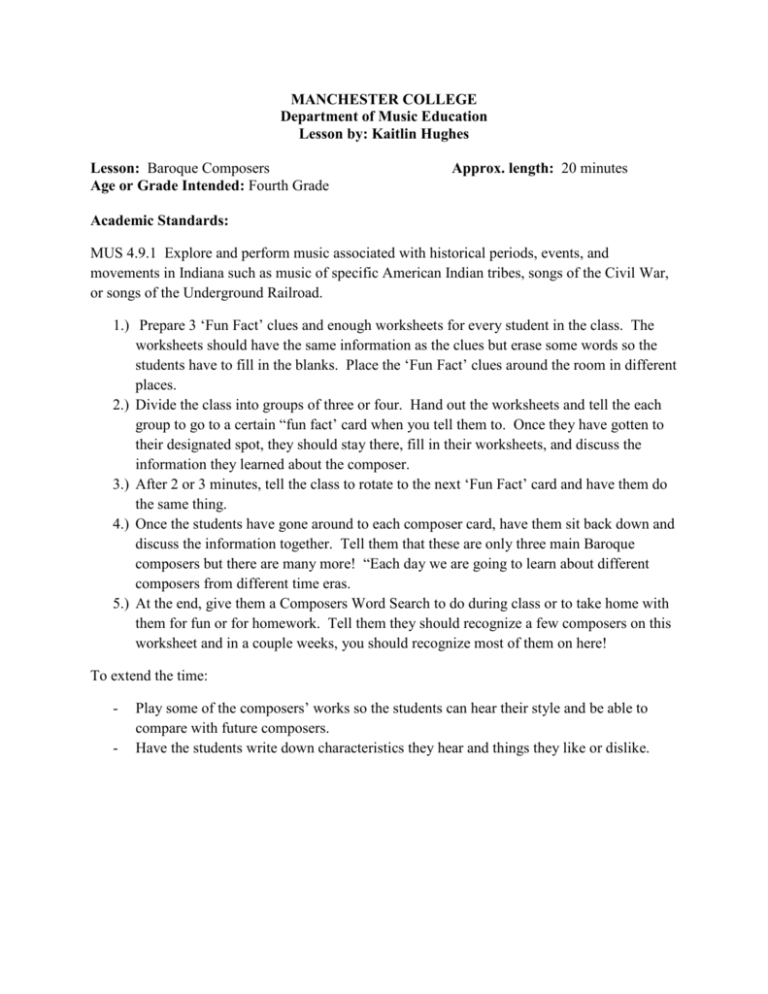
MANCHESTER COLLEGE Department of Music Education Lesson by: Kaitlin Hughes Lesson: Baroque Composers Age or Grade Intended: Fourth Grade Approx. length: 20 minutes Academic Standards: MUS 4.9.1 Explore and perform music associated with historical periods, events, and movements in Indiana such as music of specific American Indian tribes, songs of the Civil War, or songs of the Underground Railroad. 1.) Prepare 3 ‘Fun Fact’ clues and enough worksheets for every student in the class. The worksheets should have the same information as the clues but erase some words so the students have to fill in the blanks. Place the ‘Fun Fact’ clues around the room in different places. 2.) Divide the class into groups of three or four. Hand out the worksheets and tell the each group to go to a certain “fun fact’ card when you tell them to. Once they have gotten to their designated spot, they should stay there, fill in their worksheets, and discuss the information they learned about the composer. 3.) After 2 or 3 minutes, tell the class to rotate to the next ‘Fun Fact’ card and have them do the same thing. 4.) Once the students have gone around to each composer card, have them sit back down and discuss the information together. Tell them that these are only three main Baroque composers but there are many more! “Each day we are going to learn about different composers from different time eras. 5.) At the end, give them a Composers Word Search to do during class or to take home with them for fun or for homework. Tell them they should recognize a few composers on this worksheet and in a couple weeks, you should recognize most of them on here! To extend the time: - Play some of the composers’ works so the students can hear their style and be able to compare with future composers. Have the students write down characteristics they hear and things they like or dislike. Johann Sebastian Bach • Was born in Eisenach, Germany. • He had twenty children. He also taught almost all of them how to play musical instruments. • Bach composed more than 200 cantatas, which are multi-movement works predominately for vocal parts. • While Bach was alive he was known for his organ playing rather than his compositions. • Some of his major works include: The Goldberg Variations, The Well Tempered Klavier, the Mass in B Minor, Bist du bei Mir, and The Art of Fugue George Frideric Handel • Was born in Halle, Germany. • Entered the University of Halle as a law student only to abandon it and become an organist. • Handel’s father wanted him to become a lawyer, not a musician. • Handel wrote his oratorio “The Messiah” in less than a month. • Before Handel died, he lost his eyesight. Only a few of his major works include: The Messiah, Samson, As On a Sunshine Summer’s Day, and Gloria in Excelsis Deo Antonio Vivaldi • He suffered from asthma for most of his life. • He was an accomplished violin player. • He wrote about 500 concerti. • His nickname was “The Red Priest” because of his red hair and his former position as a priest. • Some of his major works include: The Four Seasons, Gloria, Manchester Sonata, and many concertos. Johann Sebastian Bach • Was born in Eisenach, • He had twenty . . He taught almost all of them how to play musical . • Bach composed more than cantatas, which are multi-movement works predominately for vocal parts. • While Bach was alive he was known for his playing rather than his compositions. • Some of his major works include: The Klavier, the Mass in Variations, The Tempered Minor, Bist du bei Mir, and The Art of Fugue George Frideric Handel • Was born in Halle, • Entered the University of Halle as a . student only to abandon it and become an organist. • Handel’s father wanted him to become a • Handel wrote his oratorio “The Messiah” in less than a • Before Handel died, he lost his • Only a few of his major works include: The Summer’s , not a musician. . . , Samson, As On a Sunshine , and Gloria in Deo Antonio Vivaldi • He suffered from • He was an accomplished • He wrote about • His nickname was “ for most of his life. player. concerti. ” because of his red hair and his former position as a priest. • Some of his major works include: The , and many concertos. Seasons, Gloria, Manchester BAROQUE COMPOSERS (A style of European Classical Music extending around 1600-1750) Johann Sebastian Bach • Was born in Eisenach, Germany. • He had twenty children. He also taught almost all of them how to play musical instruments. • Bach composed more than 200 cantatas, which are multimovement works predominately for vocal parts. • While Bach was alive he was known for his organ playing rather than his compositions. • Some of his major works include: The Goldberg Variations, The Well Tempered Klavier, the Mass in B Minor, Bist du bei Mir, and The Art of Fugue George Frideric Handel • Was born in Halle, Germany. • Entered the University of Halle as a law student only to abandon it and become an organist. • Handel’s father wanted him to become a lawyer, not a musician. • Handel wrote his oratorio “The Messiah” in less than a month. • Before Handel died, he lost his eyesight. Only a few of his major works include: The Messiah, Samson, As On a Sunshine Summer’s Day, and Gloria in Excelsis Deo Antonio Vivaldi • He suffered from asthma for most of his life. • He was an accomplished violin player. • He wrote about 500 concerti. • His nickname was “The Red Priest” because of his red hair and his former position as a priest. • Some of his major works include: The Four Seasons, Gloria, Manchester Sonata, and many concertos.
